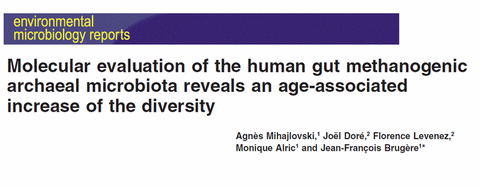2010 - Environ. Microbiol. Rep
Abstract
The methanogenic diversity of the human intestinal microbiota has long been viewed as composed of two Methanobacteriales: Methanobrevibacter smithii and Methanosphaera stadtmanae. Recently, Mx-01, a new phylotype hypothesized to belong to a putative sixth methanogenic order, was recovered from human faeces. Here we examined the diversity and the distribution of methanogens among healthy people of three age groups by analysing mcrA and 16S rDNA clones. The mcrA analysis of ∼1200 clones revealed that the usual Methanobacteriales were present without any significant difference among adults and elderly (respectively 60% and 80% of carriers, n = 40, P = 0.3). In addition, four new phylotypes that grouped with Mx-01 in the same monophyletic clade were recovered. These phylotypes were significantly more frequently detected in elderly people (40%, n = 20) than in adults (10%, n = 20, P = 0.065). In parallel, new 16S rDNA phylotypes affiliated near or within Thermoplasmatales were recovered. Altogether, these results indicate an age-related apparition of Mx-phylotypes, putatively methanogenic, which are formed of several species carrying a mcrA gene and that are not related to any of the five methanogenic orders. These species may be related to Thermoplasmatales or may cohabit with archaeal species related to Thermoplasmatales.
Mihajlovski A, Doré J, Levenez F, Alric M, Brugère JF.
Mihajlovski A, Doré J, Levenez F, Alric M, Brugère JF.
Molecular evaluation of the human gut methanogenic archaeal microbiota reveals an age-associated increase of the diversity.
Environ Microbiol Rep. 2010 Apr;2(2):272-80.
doi: 10.1111/j.1758-2229.2009.00116.x. Epub 2009 Dec 21. PubMed PMID: 23766078.
